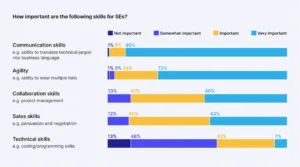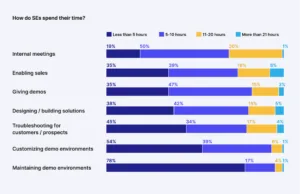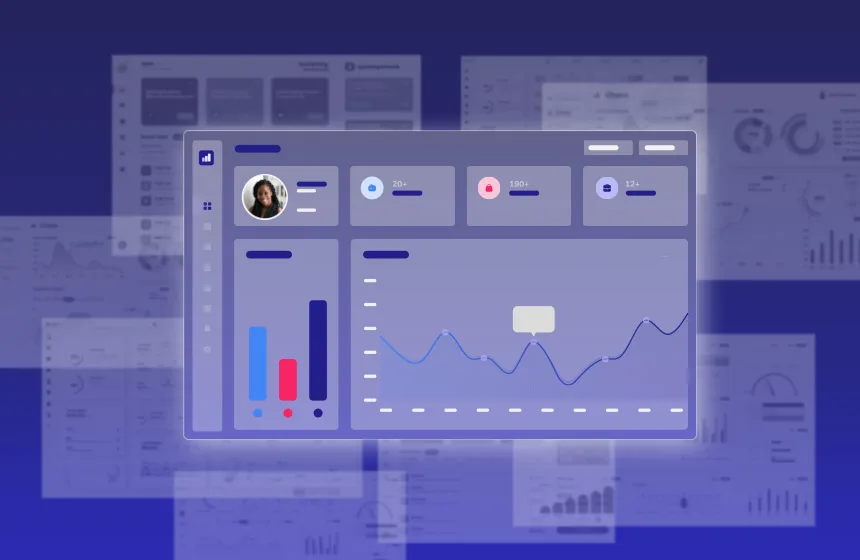Accelerate deals and increase win rates with the leading enterprise demo platform.
Now Available: The 2025 SE Career Guide

April 22, 2025
Table of Contents
We Surveyed 400+ Solutions Engineers: Here’s What We Found
Solutions Engineering is changing fast. So fast, in fact, that people don’t know what to call it.
In our survey of more than 400 practitioners, we got 19 unique responses to the simple question: “What are you called at your company?”
Still, the top two answers — Solutions Engineer (39%) and Sales Engineer (19%) — form a majority, which gave us our first learning. Shortening to “SE” is the safest thing to call the role.
What else did we learn?
- The top tools to master
- The top skills to improve
- The SE workload
- The impact AI will have on SEs in 2025
Get all that, plus salary benchmarks, career guidance, and more in the complete 2025 SE Career Guide. Read on for some of the top takeaways!
The SE Tech Stack
Solutions engineers spend a lot of time in sales and collaboration software like Salesforce, Slack, and Zoom. However, many tap into specialized tools or niche software.
- 63 specific tools were mentioned
- The top 5 (Salesforce, Slack, Zoom, Jira, and Confluence) comprised 62% of the tech stack, with the rest split between 58 other tools!
- Demo software is the most common software type specific to SEs
There were 10 major categories of technology that stood out. SEs typically use 1-2 tools in each category.
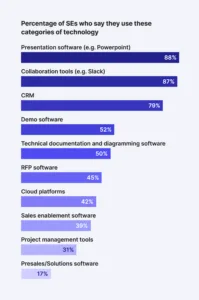
- CRM: Salesforce
- Cloud platform: AWS
- Collaboration tools: Slack, Zoom
- Demo software: Reprise
- Presentation software: Google Slides
- Project management software: Jira
- RFP software: Loopio
- Sales enablement software: Highspot
- Technical documentation and diagramming software: Miro
- Recording software: Gong, Loom
The SE Skillset
With “engineering” in the title, you’d think technical skills would be paramount.
But 13% of Solutions Engineers say technical skills aren’t important at all, and only 7% say they’re very important.
In order, here’s what SEs say are the most important skills for the role:
- Communication skills (e.g. ability to translate technical jargon into business language)
- Agility (e.g. ability to wear multiple hats)
- Collaboration skills (e.g. project management)
- Sales skills (e.g. persuasion and negotiation)
- Technical skills (e.g. coding/programming skills)
Which skills, though, are most important for accelerating career growth? It’s almost the exact opposite: SEs say technical skills (42%) and sales skills (33%) are the areas that would most benefit their career trajectory.
What Do SEs Do?
It’s no secret that Solutions Engineers are overworked. But what are they so busy with?
The data is clear. They’re collaborating with other departments — most notably Sales — and handling demos.
Their collaboration involves (a lot of) internal meetings and sales assistance. They also work closely with Product, Customer Success, Marketing, and Engineering. Given the bandwidth, SEs would like to work much more with each of those departments. Sales is the only department that some SEs think they work too closely with.
When it comes to demos, SEs spend the bulk of their time actually giving demos, yet they spend a significant chunk of time on demo maintenance and customization in preparation:
- 62% of SEs spend at least 5-20 hours per week giving demos
- 46% of SE spend at least 5 hours per week customizing demo environments
- 23% of SEs spend at least 5 hours per week on demo maintenance
What About AI?
It’s hard to talk about the future of any career without mentioning AI. Solutions Engineering isn’t any different.
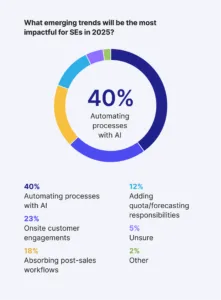
- 80% of SEs say it will be important or very important to adopt AI in 2025
- 40% believe automation through AI will be the most impactful trend in 2025
AI will impact SEs in two distinct ways:
- AI will be critical to SE workflows. Every tool in the SE tech stack is adding AI, and teams will need to adapt to stay competitive
- The technology SEs are responsible for demoing is already — or will shortly — heavily feature AI. SEs will need to be experts at demoing AI
SEs need to demo AI, talk about AI, and implement AI into their workflows. Perhaps more than any other tool or skill, an SE’s ability to adapt to AI will have an outsized impact on their career trajectory.
Want More?
There’s a lot more where this came from. Download the full SE Career Guide for all the data, more insights, and a comprehensive framework for career advancement.

